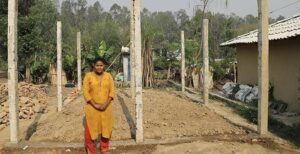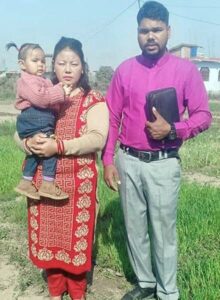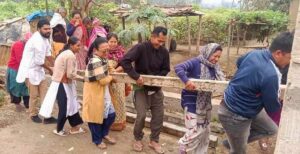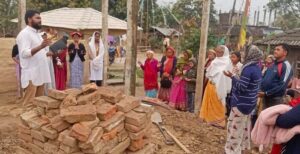Raise funds for Widows
There are many ways you can fundraise, whether it’s a bake sale, a marathon, or a party!
This website will offer limited functionality in this browser. We only support the recent versions of major browsers like Chrome, Firefox, Safari, and Edge.
She started to wonder if life was even worth living. She knew she had to press on for her daughter’s sake, but how could she?
How could she keep her daughter from experiencing the same abandonment and loss she had experienced? Was there anyone who would stand by Pima’s side even in the hard times?
Pima had grown up in a poor, religiously devout family. She attended a religious school instead of one that taught basic skills and knowledge, so she never got a complete education. Instead, when Pima was just 15, her parents arranged her marriage to a man in another country. She left home for a new husband, a new family, a new country. Perhaps she was hopeful as she embarked on this new journey, but any such hopes were soon dashed. There would be no newlywed bliss. Pima had been deceived.
Once married, Pima learned that her husband had disabilities no one had told her about. He had cognitive impairments and couldn’t speak. She was a girl abandoned in a foreign land, left to navigate life with her new husband and in-laws without support. Pima was a victim of child marriage.
Vulnerable and isolated, Pima was likely to face the same pain and challenges experienced by many girls and women ensnared by child marriage. According to Tahirih Justice Center, a U.S.-based nonprofit, “Marriage before age 18 has devastating, lifelong consequences, including greater vulnerability to sexual and domestic violence, increased medical and mental health problems, higher drop-out rates from high school and college, greater risk of poverty, and up to 80% divorce rates.”
Pima had no peace about the circumstances she now faced, but she believed she had to stay and endure. Had her parents really cared about her? After all, they had sent her, a child, to face marriage alone in a foreign country.
For three years, Pima worked hard to please her in-laws, but they mistreated her. Finally, one day, she fled in secret and returned to her home. But the house was empty.

When Pima returned to her village after the horrors of a child marriage, she found herself alone.
After returning to her home village, she learned that her parents had passed away, but because she hadn’t had communication access, no one had been able to send news to her. Once more, she must face life alone. She lived by herself in her childhood home and began earning a living for herself by hauling bricks, sand and mortar on a construction site.
As a young woman with no parents and essentially no husband, Pima lived in a vulnerable position. Yet instead of supporting her, Pima’s relatives and neighbors gossiped about her. She worked alongside her neighbor, Roul, a married father of three children. Though they didn’t have a romantic relationship, people began slandering and scolding Pima. Some pressured her to stop working with Roul, but she had to earn an income somehow, so she ignored them.
Then the community completely turned its back on Pima. Rumors spread like wildfire, and people stopped talking to Pima or including her in certain gatherings. Not only was Pima alone, but she was rejected.
Disillusioned with the values she had grown up with, Pima made a bold decision. If people were already accusing her of impropriety with Roul, why didn’t she just marry him? At least she would have someone to share life with. Pima soon became Roul’s second wife. Even though a polygamous marriage would be difficult, she would at least have some support and protection, wouldn’t she?
The marriage soon proved problematic. Though Roul welcomed Pima into his family, his first wife did not. She wouldn’t allow Pima to enter the kitchen or eat the food provided there. Roul loved Pima and provided for her basic needs, but the hostility his first wife and his relatives heaped on Pima left the young woman in constant sorrow. Eventually, she moved back into her parents’ home, though she remained married to Roul.
After five years of marriage, Pima gave birth to a daughter. No family members or relatives supported her or came to see her. Her husband hired a midwife to help her deliver the baby, but other than that, she was alone. Roul did his best to provide for Pima and their daughter, but his first wife strove to hinder him. And even with Roul’s good intentions, he simply didn’t earn enough to provide for two wives and four children. Once again, Pima felt alone. Abandoned. Hurt.

Pastor Nolen (right) welcomed Pima to his church, and he and the congregation prayed for her. She was moved by their love.
Then one day, Solana, a Christian woman in the village, learned about Pima’s situation. She talked with Pima, listened to her pain-filled life story and offered encouragement.
“My husband is a pillar to me, who raised me up,” Pima said. “He always provided for my needs, but now he has left me alone. If he wishes, he provides for my needs; otherwise, he does not. I do not see a meaning in living in this world when my own people hurt me constantly. Hatred from my own relatives, agony and scarcity never left me since I was born. It always disquieted me. … Anxiety always pokes my mind, and I get an unbearable headache. Because of all these, I want to die, but I can’t because of my daughter’s love.”
“Everyone has problems, but one has to learn to overcome them,” Solana said, attempting to ease Pima’s despair. “Think more before taking a bad step because life … is a precious gift from Someone who always loves people unconditionally and releases [them] from all bad things.”
“Who will release me when my own husband does not support me and is trying to abandon me?” Pima countered. “I don’t think that I will get relief in this [lifetime].”
But when Solana responded again with consolation and hope, Pima’s attitude shifted.
“No one has spoken to me such words that I heard from you today,” Pima said. “Your words comforted me and made me ponder before doing something.”
Pima and Solana began to spend time together, and after a few months, Pima decided to visit Solana’s church to receive prayer. There, GFA pastor Nolen and the whole congregation asked God to free Pima and give her peace.
The believers’ love and compassion stunned Pima. Were there actually people who cared about her, who wanted to help?
Pima returned to the church week after week, and the next month, she made a life-changing decision. Having experienced Christ’s love through His people, Pima chose to entrust her life to Him. Her parents had thrown her into a child marriage. Her relatives and neighbors had rejected her. Her husband had let her down. But she had found someone who promises, “I will never leave you nor forsake you” (Hebrews 13:5 NKJV).
His love carried her through the torrent of hatred, discrimination and suppression that fell when her husband and relatives learned about her new faith. Her relatives stopped speaking to her. Instead of drowning in rejection and depression, however, Pima has found comfort in knowing she has been chosen by God. She prays faithfully for her husband and relatives, and she often remembers John 15:19: “If you were of the world, the world would love its own. Yet because you are not of the world, but I chose you out of the world, therefore the world hates you.”

Pima’s church family helped construct a home for her and her daughter.
Pima also found comfort and support as she embraced the community of Christ, actively participating in church activities. Though Pima’s family and relatives had rejected her, her new family in Christ stepped in to help her. Pima’s home was old and dilapidated, but her husband couldn’t afford to build her a new one. So members of the church and Women’s Fellowship worked together to build the house pillars and construct its brick walls. Sometimes, families in the church also give Pima items she needs, and the church helps provide for her daughter’s school supplies and other school expenses.
Meanwhile, God continues to bring restoration to Pima’s life. Even her husband has seen a positive change in her, and he no longer opposes her faith in Christ. Although she still faces obstacles and experiences hatred, with the support of her spiritual family, she is remaining faithful to the One who won’t abandon her.
“When I gave my life to the Lord and accepted Him as my Savior, He helped me to get rid of my problems and made my life happy,”
“When I gave my life to the Lord and accepted Him as my Savior, He helped me to get rid of my problems and made my life happy,” Pima says. “Now, I have learned to face the problems and overcome them. No matter what problems and obstacles come in my life, I will never abandon the Lord because He is the true God and Redeemer for all.”
Like Pima, many women in developing countries, especially widows and single mothers, experience loss, rejection and discrimination. They don’t know the God who sees them, values them and protects them. He is using His Church to share hope with these women and welcome them into His family. You can equip our brothers and sisters in Africa and Asia to bring compassionate help to the widows, single mothers and other marginalized women in their communities.

Pima’s new family in Christ, praying for the home they were helping her build. You can help believers in Africa and Asia stand with widows, single mothers and other marginalized women in their communities.
There are many ways you can fundraise, whether it’s a bake sale, a marathon, or a party!